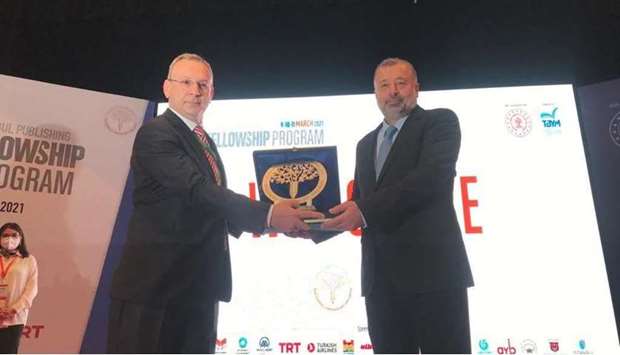Hamad Bin Khalifa University Press (HBKU Press) has won third prize at the Istanbul Copyright Awards as part of the sixth International Istanbul Fellowship Programme (IFP).
The awards aim to encourage the exchange of copyrights from Turkish to foreign languages and contribute to the development of the publishing sector and cultural co-operation in the region.
Organised by the Turkish Press and Publishers Copyright and Licensing Society with support of Turkey Ministry of Culture and Tourism and Governorate of Istanbul, the awards honour foreign publishing houses that contribute to the translation of works from the Turkish publishing sector into other languages.
“HBKU Press is committed to engaging in the cross-cultural exchange of information with fellow publishers in Turkey and with international publishers around the world,” explained Bachar Chebaro, executive director of HBKU Press. “This award further cements HBKU Press’s integral role in the copyright exchange market in the region and beyond.”
HBKU Press was recognised among 52 publishers from 26 countries participating in the sixth International Istanbul Publishing Fellowship for its continued efforts in cultural rapprochement.
“HBKU Press is distinguished for its publication genre diversity as well as the high quality of its publication’s production, which meets international standards,” said Dr Mohamed Agirakca, vice-president of the Award Committee of the IFP. “The evaluation committee was extremely impressed with HBKU Press’s work and commitment to cultural exchange with Turkey through its continued participation in the International Istanbul Publishing Fellowship and its bilateral support of the publishing sector in the region.”
Over the past few years, the copyrights to several award-winning and notable Turkish language books were acquired, translated, and published by HBKU Press into Arabic. Conversely, the copyrights of works by several high-profile Qatari authors and other HBKU Press books were translated into Turkish as well.
“Copyright exchange and translations support the transfer of thought and knowledge between different people, societies and cultures,” added Chebaro. “It becomes a pivotal way to promote Arab literary and academic talents to the world, while also introducing new modes of thinking to our audience in Qatar.”

